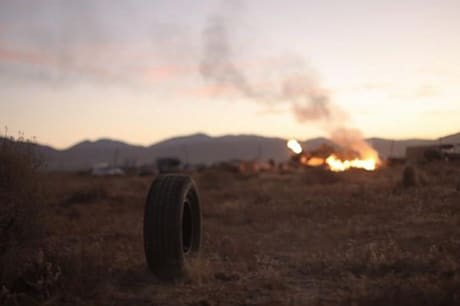Rubber isn't a simple farcical horror comedy about a psychokinetic, murderous, sentient tire. Okay, that premise alone doesn't sound overly plain, but the cheeky, self-aware film by the man electronic music fans ― or anyone who watched Much Music in the '90s ― know better as Mr. Oizo is more directly an absurdist experiment in expectation skewering. A fourth-wall breaking introductory monologue acts as a statement of intent while simultaneously setting up multiple layers of meta-commentary. Subtly is not on Rubber's agenda. Casually exiting the trunk of a car that has just intentionally mowed down haphazardly arranged chairs in the desert, Lieutenant Chad (played with a dedicated seriousness amid the ridiculousness by Stephen Spinella) delivers the aforementioned monologue on the importance of the element of "no reason" in cinema directly to the camera before revealing an audience awaiting a spectacle. They are given binoculars to watch and comment, or as with any audience, be annoyed by the jaw-flappers who won't shut up and watch the movie, as a tire rises from the dirt, learning to roll, then to crush and, finally, to mentally explode that which cannot be crushed. Credit is due to writer/director/cinematographer Quentin Dupieux for his ability to clearly convey the emotional inner world of a tire. There's never any question of how it's feeling or what its intentions are through the simple use of popular cinema's habit of anthropomorphising anything non-human to service a human story. A simple music cue makes obvious the tire's desire for companionship and between exploding the heads of inconsiderate flesh bags it begins stalking a young French woman (Roxane Mesquida) at a drab roadside motel. Frequent acknowledgements of the predictable and conventional storytelling are used to subvert those very formulas, with attempts made to prematurely end the film by offing the spectators and speed up the action, all while poking fun at the habits of viewers and conventional filmmakers alike. Even with its relatively short runtime and meta-run-arounds, Rubber feels a little long due to an over-abundance of shots of the tire just rolling along the highway. Beautifully shot digitally with, presumably, the Canon 5D Mark II or a similar model (actor Jack Plotnick describes it as "the one that looks like a normal camera" in an interview feature), Dupieux expresses his thoughts on the death of 35mm cameras in a wholly bizarre self-directed interview. And seeing what he has accomplished, it's hard to argue. Back to that interview, Dupieux discusses his process and intentions with a male blow-up doll while most of what he says in French (the film is a French production shot specifically in English) is run backwards and subtitled. Additional interviews with Spinella and Mesquida are pretty straightforward, but either by the nature of editing or working with Dupieux, the zany auteur's idiosyncratic touch is always present. Brief tire test shots and the theatrical trailer round out the features in this thoroughly enjoyable satire of Hollywood's cinematic conventions.
(Mongrel Media)Rubber
Quentin Dupieux

BY Scott A. GrayPublished Jun 7, 2011